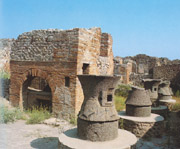
THE BAKERY IN POMPEII
Difficult as it is to trace the origin and development of a commercial corn-grinding industry in Pompeii, there seems no doubt that it was becoming steadily more important in the later Republic. By the early days of the Empire the citizens of Pompeii seem already to have been largely dependent for their bread upon commercial bakeries. The commercial mills were enlarged versions of the hand mill or quern. The only tolerably complete specimen of a such mill is that discovered under the ashes of Pompeii where thirty-one of them were found. The machinery for the production of bread consists of millstones in porous lava, very compact tough stone so there were no risks of its losing tiny fragments in the grinding process which might be mixed with the flour. The form of these mills resembles an hourglass with a biconical or hollow catullus which rotates above on a cone-shaped pivot (meta), set on base in masonry and surrounded by a paved floor on which the animals yoked to the beams inserted in the catullus walked. These mills were clumsier than they need have been because the heavy hopper holding the grain above the grinding stones was also made of stone, although a lighter material such as wood or wicker would have been equally effective; but slaves and asses alike were expendable. Apuleius’ Golden Ass, the strange story of the man who was changed into an ass, contains some gruesome descriptions of the merciless hard labour of slaves and asses in a flour mill. But perhaps the fact that Apuleius could invite Romans to imagine the sufferings of an ass and of the slaves in such a place is evidence that imaginative sympathy was possible even in the Roman society. We have no means of knowing whether the horrible conditions he describes were very general. What is certain is that an industry which had always been carried on first by women and then commercially by slaves and animals was regarde as of poor repute. Nothing but abject poverty drove a free citizen to the mills. The Roman playwright Plautus around 200 b.C. had been forced at one time through poverty, and as a last resort, to grind corn for a living.






